“We’re here to party, man!”
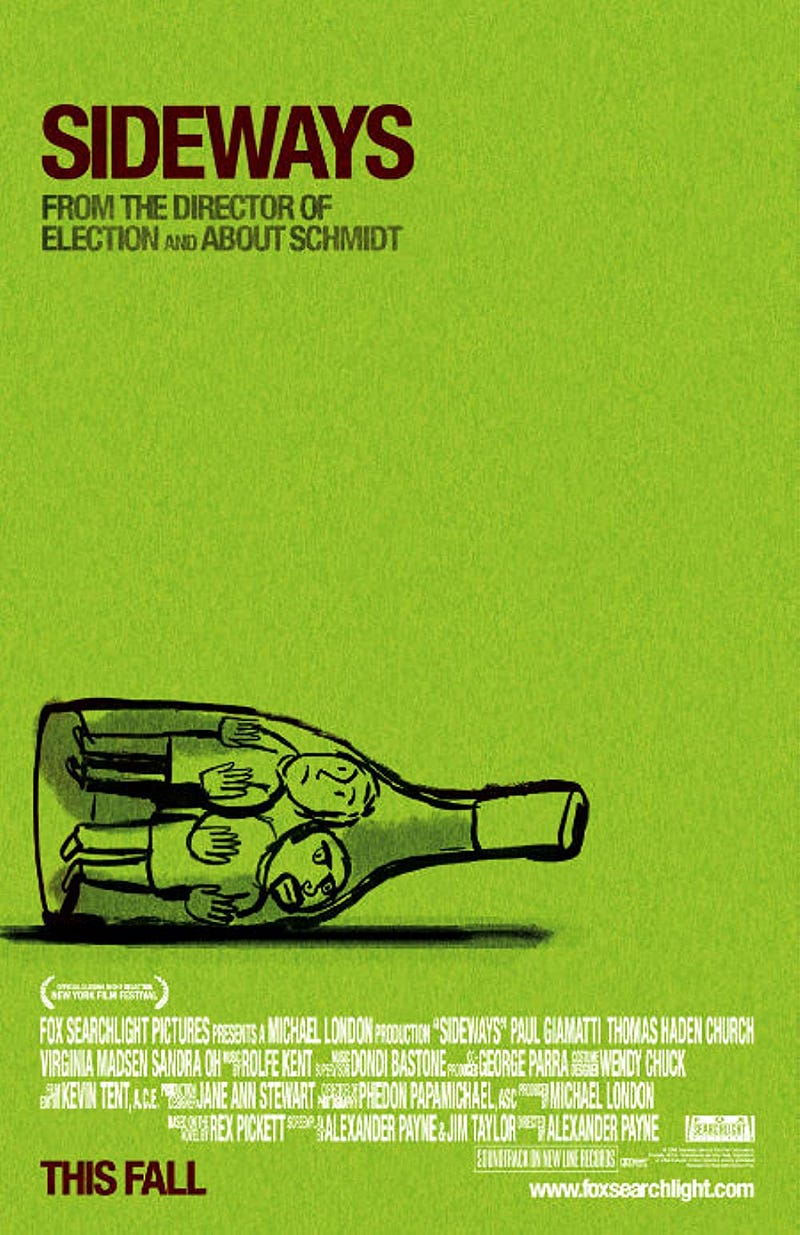
As I hope you will agree shortly, I’ve already gushed forth enormous praise for this magnificent film in my original blog article reproduced below, so I’ll keep this introduction brief and, in honour of the Miles character, perhaps a little comedically wistful. For I am Miles, except for the ability to write an unfinished book and drink vast quantities of wine, but I am Miles and I hope you see some of yourself in these marvellously chaotic characters too. My review begins with a typically flamboyant and angry “tailspin” from our literary hero mid-way through the film before I revert to a scene-by-scene analysis of the opening fifteen minutes by way of introduction to Miles and his friend Jack, and a week of golf, sunshine and wine tasting ahead of them before Jack’s impending marriage.
Sideways was Alexander Payne’s fifth foray into the directors chair and two years on from 2002’s Oscar nominated About Schmidt. The Descendants followed seven years later before Payne would direct a film almost the equal of Sideways, 2013’s incredible ode to familial love, friendship and the unsteadiness of growing old, Nebraska.
All four films are covered in depth and spoiler free within the blog article immediately below, or please continue onward for the comedic trials and tribulations of Miles and Jack.
Alexander Payne — 4 films for your consideration
About Schmidt, Sideways, The Descendants and Nebraska. All lovingly appreciated and spoiler free.medium.com

“If anybody orders merlot, I’m leaving. I’m not drinking any fucking merlot!”.
Please accept my sincere apologies for the above tag line. It’s purely a personal indulgence as it represents my favourite segment of the film and as well as being absolutely hysterical it’s also reflective of many of the touchstones of the film’s overriding themes and a snapshot of our two male protagonists in this astonishing film. “Miles” (Paul Giamatti) and “Jack” (Thomas Hayden Church) may ostensibly be old College roommates and lifelong friends but they are so much more than that as they interchange roles between an old married couple bickering about any and everything to two disparate individuals in the middle of their lives with completely polar opposite views and of a seemingly parental/child relationship, one forever pulling the other into line with an admonishment or a reminder of their responsibilities and commitments.
Usually it’s Miles who takes the parental role to Jack’s hyperactive, over the top and somewhat childish persona but here in the pivotal scene mid-way through the film it’s Jack’s turn to assume the responsibility of a parent over their wayward child as Miles, seemingly forever plagued by bad news is in yet another “tailspin”, a little drunk and recovering from yet another personal setback in his life.
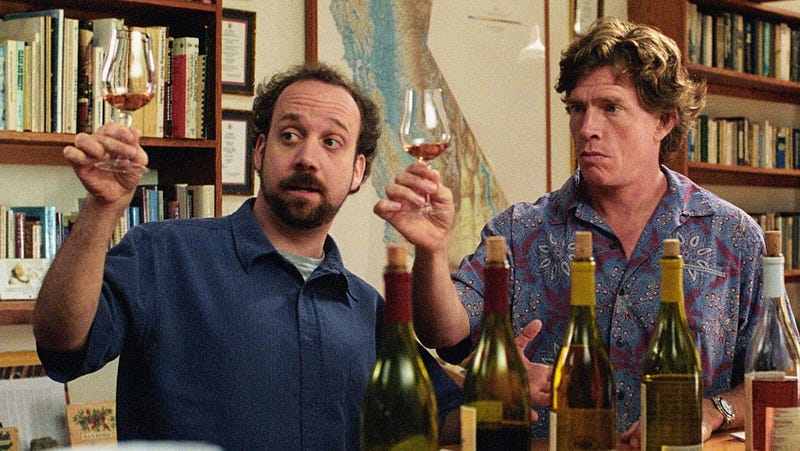
To make matters (comically) worse, Miles also has to play along with yet more lies emanating from the mouth of his friend and to feed his insatiable appetite for casual sexual liaisons. Jack is determined to make the most of their week together but not quite in the manner that Miles had intended to send his friend off into his upcoming marriage. He has to lie (again) about his newly agreed book publishing deal and following a pep talk from Jack he has to find his humorous and gregarious side (again), thus ensuring he doesn’t sabotage Jack’s intended night of sexual debauchery. Following his hilarious and sarcastic retort of “aye aye Captain” Miles has one further stipulation being the renowned wine connoisseur that he is, no merlot will be consumed under any circumstances and although he receives a categorical assurance that this line will not be crossed he soon capitulates and ventures over to the “the dark side” under the pressure of a brilliant, light hearted, fun and boozy evening with great company and despite his humorous and chaotic attempts to ruin the evening, he fails.
But then again, Miles always fails!

This in a nutshell is the beauty of this wonderfully funny, acerbic, heart breaking but colourful, vibrant and warm film. A tale of constant lies and deceit, friendship, heartbreak, self discovery and self examination set amongst the rolling hills, vineyards and beautiful coastline of southern California as two friends try desperately to enjoy a final week of freedom before returning to marriage, work and a book full of typos and existential angst.
I had the immense pleasure of seeing this film at my local picture house ten years ago and I look forward to re-watching it anytime I or a companion suggests doing so. Along with Paul Thomas Anderson’s Magnolia it’s a film on strict and constant rotation! I instantly fell in love with Sideways at the cinema all those years ago and am still fascinated and in love with every sun kissed, melancholic frame now. In another shameless sense of self regarding nonsense I love this film for deeply personal reasons for as well as being Clarence Worley in Tony Scott’s eponymous True Romance and Jerry Lundegaard in the Coen Brothers directed masterpiece Fargo, I am Miles, to an absolute golfing tee, here in Alexander Payne’s Sideways.
OK I can’t consume wine in such voluminous quantities as Miles, nor do I drive a classic shaped red Saab convertible and I’m clearly not an accomplished writer either, but every look, every half smile and every lament, sarcastic comment and heart breaking regret is me to a tee. I also like to think I share his warmth, his soul and his heart of pure gold that’s hidden beneath the veneer of his problems, but that’s for others to judge and decide. For now, I am Miles and being the narcissist that I am, I can’t help but love him and laugh heartily at the inside japes and jokes, as well as his inner torment. But we’re getting ahead of ourselves. Here is a brief dissection of the opening fifteen minutes with as much love and reverence as I can muster:
The film opens in pitch black darkness accompanied by an incessant knocking on a door which grows louder until the knocks themselves resemble that of typewriter keys being punched and the film’s title is similarly “typed” onto a dark black screen. Miles, now shaken from his slumbers for the first of many times in the coming film answers the repeated knocking on his front door and despite being only half awake and indeed only half dressed rushes out of his apartment and amidst a flurry of profuse apologies moves his car. The first of many title slides appear before us, “Saturday” and this is also a recurring theme of the film as the day’s of the week appear as segues between scenes.
Both the editing from long time friend and collaborator Kevin Tent and the joyous bouncy jazz infused musical soundtrack from Rolfe Kent are evidenced in the opening segments however against the background of Tent’s frenetic editing and Kent’s beautiful musical accompaniment is a foul mouthed, hungover and already late Miles as he rushes back to his apartment. A telephone apology later and an assurance that he’s “out the door” Miles is anything but as he studiously reads a novel whilst sitting on the toilet, taking a long and luxurious shower and flossing before we cut to him smiling amiably and taking his time at a nearby bakery as he orders a New York Times and a croissant. Why rush? After all, he has an entire week of relaxation, wine tasting and golf ahead of him before he sees his friend off into the blissful land of marriage and commitment!
We cut back to Miles joining the freeway in his distinctive yet beaten up old style red Saab convertible and although late, Miles is happily driving sedately whilst being overtaken on a busy freeway. Why rush? He has an important New York Times crossword to complete after all! However “Mr Prompt” finally arrives at a sumptuous looking detached family home for his meeting with Jack and his large family of prospective in-laws. Miles apologises (yet again) for arriving late, lies (again) for his late arrival and appears nervous and sheepish even among friends. Jack is eager to leave and make up for lost time however Miles is more than happy to give his opinion on the desired make up of the wedding cake but Jack feels the need to break up the happy gathering with the first of his litany of lies throughout the film. He announces that Miles’ book is to be finally published, leaving his friend to smile awkwardly through the questions that follow before the two friends smile profusely and wave as they finally depart for the week.
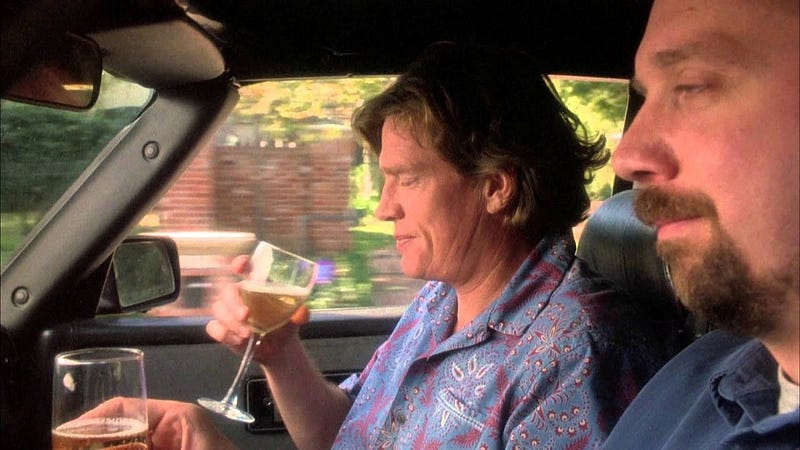
JACK: “Where the fuck were you man? Huh?”
“I was dying in there!”
The start of the friends journey is simply captured with a camera on each and inter cut between the two as Jack is infuriated at his friend’s tardiness and desperate need to escape for the week whilst Miles is furious at his friend’s extreme exaggeration of the truth regarding his book. The polar opposite nature of the two friends is established immediately too, with Miles apprehensive at the week ahead and clearly already on edge despite providing alcoholic sustenance for the journey. Jack on the other hand is free and determined to make every possible moment count, including opening a rare bottle of wine “a 1992 Byrom” immediately!. Awkward smiles abound as the friends toast their friendship and the journey ahead before Miles sincerely proclaims “Despite your crass behaviour, I’m glad we’re getting this time together”.
Their week ahead is planned to be a joyous one and Miles in particular is looking forward to imparting his vast, expert knowledge of wine to his friend however one further cut later, and set against the backdrop of a beautiful Californian shoreline the friends are sharing terse words again as Miles’ book isn’t being published and the ending hasn’t been re-written despite what his nonchalant friend may think! These amusing segments are captured again with a simple camera on each of them inside the car before Miles has to make an important detour.
It’s Miles’ Mother’s Birthday and “she’s, uh, seventy…….something” and her dutiful son can’t possibly drive by on their route without stopping off to wish her a happy Birthday. Hurriedly, he scrawls a birthday greeting into a card and with Jack carrying the shop bought flowers (with price tag still attached) they approach Miles’ Mother home. Thankfully they do as it introduces us to the first of many sublimely comical cameo performances from “Miles Mother” (Marylouise Burke) and what follows is a staple of Alexander Payne’s films, that of a painfully awkward family reunion and after Miles’ insistence, a family meal that both Miles and Jack smile awkwardly through. Oblivious to all of this is Miles Mother who is very excited to see her son after such a long absence and his actor friend.
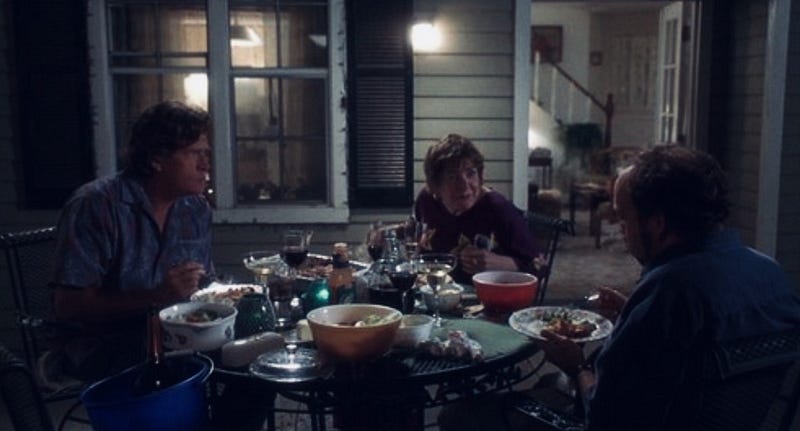
Early in the already growing awkward family meal Miles excuses himself and leaves Jack to smile through his Mother’s recollections of his acting prowess whilst he tiptoes upstairs and into his Mother’s bedroom. Surreptitiously he steals a thick wad of $100 notes before quietly returning the tin containing his Mother’s emergency supply of cash however as he does so his eyes, and that of Payne’s camera, are drawn to the numerous framed photographs that adorn her dressing table. With extreme close ups we see numerous pictures of happier times with Miles and his Father, a family gathering and importantly, a picture of a smiling and blissfully happy Miles on his wedding day. The colour of this photograph is important as it’s clearly fresh and recent in age and as the camera cuts to Miles his already darkened demeanour is blackened still further. Miles returns to the dinner table and is unable to hide his dark mood despite Jack and his Mother’s light hearted smiles and conversation.
Talk resumes of Jack’s impending wedding before Miles’ Mother asks when he will marry again? “I just got divorced” is his terse reply before impertinently calling his Mother by her name and it’s clear that Miles’ balloon has been well and truly pricked as he ignores Jack’s insistence that it was two years ago and he should clearly move on with life. The scene ends with Miles’ Mother offering her son some money for his trip before a title slide of “Sunday” appears and the two friends quietly tiptoe out of the house leaving the Mother asleep on the sofa opposite her flowers still wrapped in cellophane with price sticker still attached.
Sideways is based on a novel of the same name by Rex Pickett and Alexander Payne, together with his writing partner Jim Taylor, secured their first Oscar successes for their Best Adapted screenplay of the source novel. The film itself garnered four further nominations at the 2005 Oscars with Payne receiving a further nomination as Best Director, the film was nominated in the Best Film of the Year category and both Thomas Hayden Church (Best Supporting Actor) and Virginia Madsen (Best Supporting Actress) were thoroughly and wholeheartedly deserving of their respective first time nominations. Suffice to say it baffles me to this day how Paul Giamatti wasn’t recognised for his unbelievable performance in his leading actor role as Miles as it’s a performance that has everything as it veers from sublime comedy to deep existential melancholia through nuanced touches and reflections in a portrayal he was destined to play and one which he thoroughly excels and calls his own.
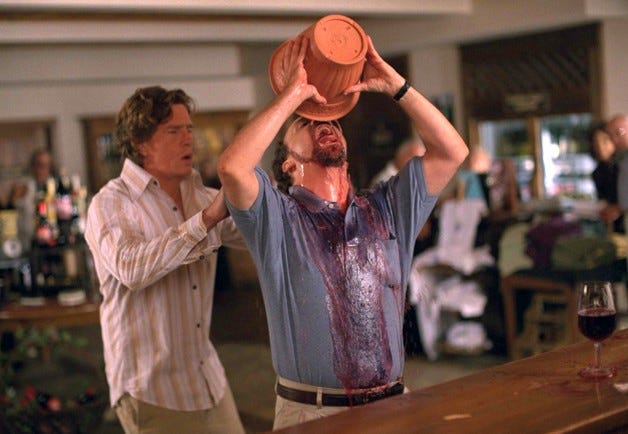
No-one but Giamatti could have portrayed a highly unlikeable character such as Miles with such wit and verve, such over the top desperation but yet at the same time bringing home to the audience his true heart of gold with such a range of righteous anger and despair through to so many touches, glances and half smiles. Half of Miles’ life has passed him by and he has “nothing to show for it” except grief, loss, a borderline alcoholism problem, a painful divorce and a highly personal book that isn’t going to be published. As the film nears it’s conclusion Miles and Jack sit beach side reflecting on their middle aged lives as Miles laments “The world doesn’t give a shit what I have to say. I’m unnecessary” before Jack, forever being helpfully unhelpful tries to rescue his friend from another enveloping bout of melancholia. Miles would do any and everything for others but strangely not himself it seems, but his struggles with depression, anxiety and being totally socially inept are hysterically funny at times and heart breaking at others.
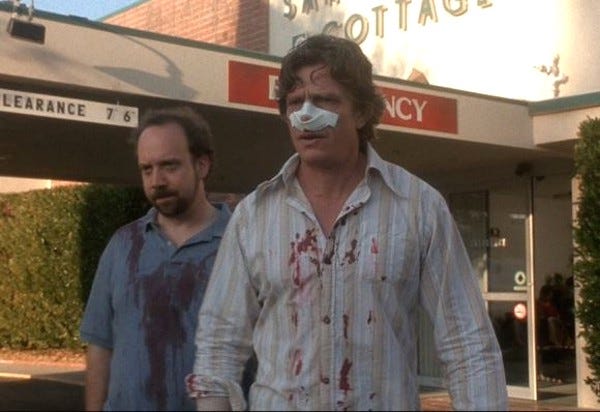
All of which is in stark contrast to Jack, a bygone TV Actor and now advertisement voice over artist who is carefree, irreverent but stunted both intellectually and culturally with a childlike demeanour and no thoughts whatsoever for his impending wedding and seeking only to sate his voracious appetite for casual sex. Thomas Hayden Church thoroughly deserved his Oscar nomination for, if nothing else, turning a horribly unlikeable character into one you cheer for and laugh along with! “We’re here to party, man!” is Jack’s mantra and in one of the film’s many central themes he meets his match in every possible way in “Stephanie” (Sandra Oh) and Sandra Oh infuses another slightly unlikeable character into one you can’t help but triumphantly cheer for in a spectacularly brilliant scene that leads us into the highly amusing last Act of the film.
However, Miles too also meets his match in every way possible in “Maya” who is excellently realised by Virginia Madsen in her Oscar nominated portrayal of the angelic, innocent and almost ethereal Maya, a waitress at what Miles proudly calls his “office”, a local restaurant called The Hitching Post. Maya is the only character of the four who is instantly likeable as she glides almost effortlessly across the screen and back into Miles’ life once again. Taking up residence in his office, Miles has been falling in love with Maya for some time and now reunited, he finally realises he may have actually met his match all along and in every way possible, and in one of the numerous signature scenes of this wonderful film this is captured perfectly by the Director as the two reluctant lovebirds discuss a life long fascination with wine. Their joint scenes are both touchstones for the film and indeed it’s beating heart but their porch scene is brilliantly realised and a scene that is a joy to behold time and time again.
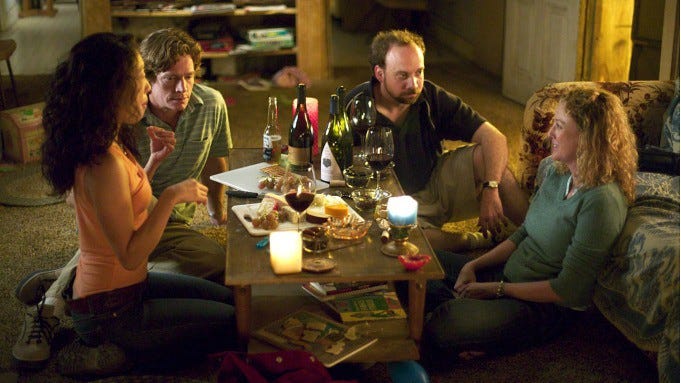
So how does Director Alexander Payne take a depressed writer, a sex mad lothario and two beautiful ladies who collide into their detestable world and turn it into Oscar gold? Quite expertly indeed now that you ask!
Sideways is littered with highly comedic interludes, from Jack chasing a drunk Miles down a hill into a vineyard to a deliberate car crash that goes horribly awry, to Miles hilariously rescuing his friend’s wallet (and wedding rings) before escaping from a large swinging penis! There are many, many more such scenes to enjoy. The film is edited brilliantly by long time collaborator Kevin Tent and with the inclusion of rolling split screens the narrative moves at a tremendous pace throughout and highly complimented by Rolfe Kent’s jazz infused soundtrack that only deviates to a simple piano tune to highlight Mile’s highs and lows. One short scene typifies the genius of Alexander Payne’s directing as he employs every camera angle possible (above, below, obtuse and oblique and especially extreme close up) on Miles’ angry, drunken and desperate telephone call to his ex-wife. Giamatti plays it heartbreakingly well but Payne’s directing takes the short scene to another level of intensity as he backs and stifles an already desperate man into a metaphorical corner with his camera.
Sideways has everything: four stunning character portrayals set in a sun drenched paradise as their lives veer from the sublime to the ridiculous, from utter joy to crushing existential sadness but shot through the prism of brilliant black comedy. Above all, Sideways is a love story and I might, just might, go now and knock on someone’s door. But then again, I’m not really Miles and I don’t have his admirable spirit or the courage of his convictions.
Thanks for reading. Just for larks as always, and always a human reaction rather than spoilers galore. My three most recently published film articles are linked below or there’s well over 200 blog articles (with 400+ individual film reviews) within my archives from which to choose:
“Zodiac” (2007)
The Best of David Fincher — Vol 3.medium.com
“The Kings of Summer” (2013)
Charming debut from Jordan Vogt-Roberts.medium.com
“Source Code” (2011)
“You’re acting really strange this morning”.medium.com


